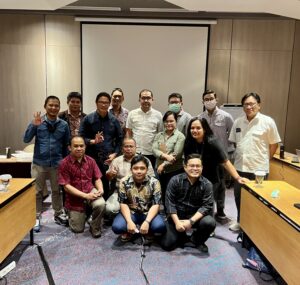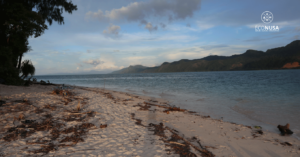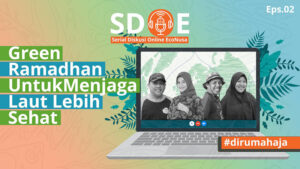
Ramadan fasting month could be a momentum to care for Earth. One thing we could do is by “fasting” by not using single use plastic. Let alone, during the lockdown amidst the Covid-19 pandemic, cooking at home for breaking the fasting and predawn meal (sahur) could become a new positive lifestyle.
“Green Ramadan gives us chance to remember and give appreciation to Earth as God’s creation that has sufficed all needs to survive our lives,” said Lita Hendratno, the finalist of Miss Indonesia 2018, on an online discussion entitling “Green Ramadan to Sustain Healthier Ocean” held by EcoNusa Foundation on 28 April 2020.
According to Lita, “fasting” from plastic could be done in many easy ways. When we break fasting or eating predawn meal outside, we can bring with us our own meal utensils. It implies that we can avoid using Styrofoam and plastic bottle and thus minimize the new plastic waste.
“Let’s assume that every person uses 700 plastic bags at average per year. When accumulated by the number of Indonesian populations, there will be around 9.85 billion single use plastic bags which end up in plastic waste,” Lita said.
The world has put its serious concern with plastic waste. A study conducted by Jenna Jambeck (2015) found that Indonesia is one the top two countries producing plastic waste on the ocean. In 2019, there were 1.2 million tons of waste on the Indonesian ocean. As from the figure, 80 percent is plastic waste from land flowing through the river to the sea as the final end.
The existence of plastic waste on the ocean destroys an esthetic. Ocean habitat such as coral reef and sea grass is damaged. The death of sea animals due to plastic waste on their digestive organs became viral news last year. Sea debris also disrupts sea transportation paths.
As an archipelagic country, the World Bank names 87 coastal cities in Indonesia for contributing 2 million tons of plastic waste to the sea in 2018. “If Indonesian peoples do not reduce the consumption of single use plastic, the amount of plastic waste will go beyond the amount of fish on the Indonesian ocean by 2030,” said Nirwan Dessibali, the director of Sea Conservation Foundation.
The condition will endure for longer time given the fact that plastic takes long time to be naturally degradable. The waste will turn to be microplastic which might risk of entering human body. Many studies found microplastic in the Indonesian ocean. Microplastics are also found on the fish, salt, oyster and sea grass.
“One of the keys to solve the issue lies in the hand of young people. They have prospective potentials. Last time we cleaned up Tanjung Bayang Beach and collected 1.4 tons of waste. We, moreover, invited kindergarten students to take part to study on the sea so as to nurture their concern to environment,” said Nirwan.
Head of Makassar Municipality’s Environment Office, Iskandar, said that the solution of plastic waste problem cannot stand alone. As to him, all elements should work hand in hand. Upon realizing this issue, Makassar City Government issued Mayor Regulation No. 70/2019 on Plastic Bag Control. Makassar City Government also established Technical Service Unit (UPT) for a Makassar City’s Waste Bank. Makassar now has more than 500 waste banks around the city.
“Makassar City is one of the cities with waste bank in Indonesia. We have already had a vendor through UPT,” Iskandar said.
Editor: Leo Wahyudi




